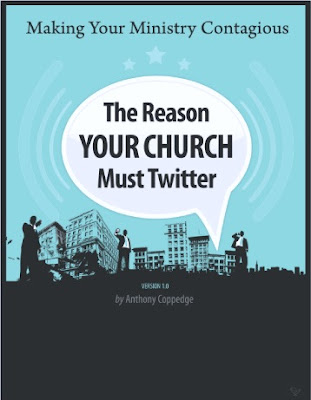
Churches are excited about Twitter. It’s what the kids are doing these days, so many churches have launched campaigns encouraging people to tweet during services. This might be the new version of being allowed to pass notes during class, except your device carries more status. iPhone? Niiiice! Basic Nokia piece of crap that was free with your plan? Pfft. (Coffee consumption whilst tweeting scores you extra relevance points.)

96% of blog entries written by a pastor (or his tenebrous cousin, the creative pastor) on the subject of Twittering follows this trajectory:
“I know Twitter isn’t for everybody.”
“I’ll admit it, there are some things even I don’t like about Twitter.”
“In my church, I have seen life-altering small groups formed and forged through Twitter.”
“I have seen teams of people mobilized to do volunteer service like nothing else in the past through Twitter.”
If someone in the church should have a non-Christian friend (not too likely, but just in case) and that friend should follow them on Twitter, guess what. That person has to read every little thing his church friend writes. But this will only be positive advertising if the person following him thinks that the church tweeter is actually nice, smart, or even better, cool. If Church Tweeter isn’t viewed highly and people are just following your tweets because they want to know where traffic jams are, this might not work out too well for your church numbers.
But all of this begs the question, if you’ve finally found some quiet for the first time during the weekend, do you really want your phone to go off and tell you that Pastor Mark sure is on fire today? And if you’re having a soul experience at church, do you really want to be typing into your phone about it? Can you have a soul experience from reading other people’s tweets about their soul experiences? Are we trying to keep ourselves occupied to distract ourselves from the stillness that could hold something scary? Maybe not, but it’s worth asking.
‘There are quiet places also in the mind’, he said meditatively. ‘But we build bandstands and factories on them. Deliberately — to put a stop to the quietness. … All the thoughts, all the preoccupations in my head — round and round, continually, What’s it for? What’s it all for? To put an end to the quiet, to break it up and disperse it, to pretend at any cost that it isn’t there. Ah, but it is; it is there, in spite of everything, at the back of everything. Lying awake at night — not restlessly, but serenely, waiting for sleep — the quiet re-establishes itself, piece by piece; all the broken bits … It re-establishes itself, an inward quiet, like the outward quiet of grass and trees. It fills one, it grows — a crystal quiet, a growing, expanding crystal. It grows, it becomes more perfect; it is beautiful and terrifying … For one’s alone in the crystal, and there’s no support from the outside, there is nothing external and important, nothing external and trivial to pull oneself up by or stand on … There is nothing to laugh at or feel enthusiast about. But the quiet grows and grows. Beautifully and unbearably. And at last you are conscious of something approaching; it is almost a faint sound of footsteps. Something inexpressively lovely and wonderful advances through the crystal, nearer, nearer. And, oh, inexpressively terrifying. For if it were to touch you, if it were to seize you and engulf you, you’d die; all the regular, habitual daily part of you would die …. one would have to begin living arduously in the quiet, arduously in some strange, unheard of manner.’ – Aldous Huxley, Antic Hay
“Step out of the traffic! Take a long, loving look at me, your High God, above politics, above everything.” – Psalm 46:10, translated from the original Hebrew [it was Hebrew, right?] by Eugene Peterson

